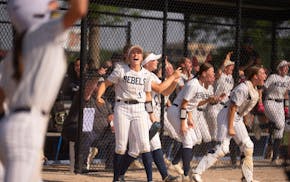The high schools that grew up together in the Minnesota River Conference grew apart.
The result: The current members have voted to disband the conference, which was formed in the late 1950s by schools in the far southwest portion of the Twin Cities metro area. The MRC will dissolve after the 2023-24 school year.
"We've had some turnover in the last 10 years as some schools have gotten too big and decided to leave," said Dan Gardner, the conference's executive director off and on for two decades. "There are a number of schools in the conference that have just stayed the same. Enrollments are flat. The ones closest to the Twin Cities … they just grew so fast they outgrew the other schools."
The conference's current members — Belle Plaine, LeSueur-Henderson, Lester Prairie, Mayer Lutheran, Norwood Young America, Sibley East and Tri-City United — are left to seek spots in other conferences or work with the Minnesota State High School League to be placed in another conference.
Tri-City United a month ago proposed a move to the Big South. Gardner said the Wright County Conference had shown interest in a couple of the schools.
All of the schools have had a head start on seeking new landing spots, Gardner said, because change clearly has been coming.
"The last couple of years it's been a deep discussion among conference schools," he said. "… This day was going to come eventually, and it came."
The MSHSL's list of enrollments for the 2023-24 school year show that MRC members range in size from Tri-City United's enrollment of 494, which places it in Class 3A for football, to Lester Prairie's 139, eligible for Nine-Man football. Over the years the conference has included, among others, Jordan (601 enrollment in 2023-24), Holy Family (456) and Southwest Christian (418).
The conference began with members Arlington-Green Isle, Belle Plaine, Jordan, LeCenter, LeSueur, Montgomery, New Prague and Norwood Young America. Gardner said he and others have turned up records going back to 1959 but that "nobody is for sure" that the conference formed then.
Change is difficult after more than six decades, Gardner said.
"I'm probably the last relic, the oldest sitting at the table when we have our meetings, and it causes a little pain, it does," he said.
Randy Walsh, the conference president, worded it another way in the announcement of the decision.
"It is a bittersweet, mostly bitter feeling," Walsh said. "But in the individual interests of the schools, this was the right decision."

Home runs by Ryan Jeffers and Harrison Bader lift Twins past A's

Softball state tournament, live from North Mankato: Bloomington Jefferson, Champlin Park reach 4A final
Twins starter López has Grade 2 shoulder strain, expected to miss 2-3 months
Festa gets his wake-up calls and joins Twins in Sacramento
